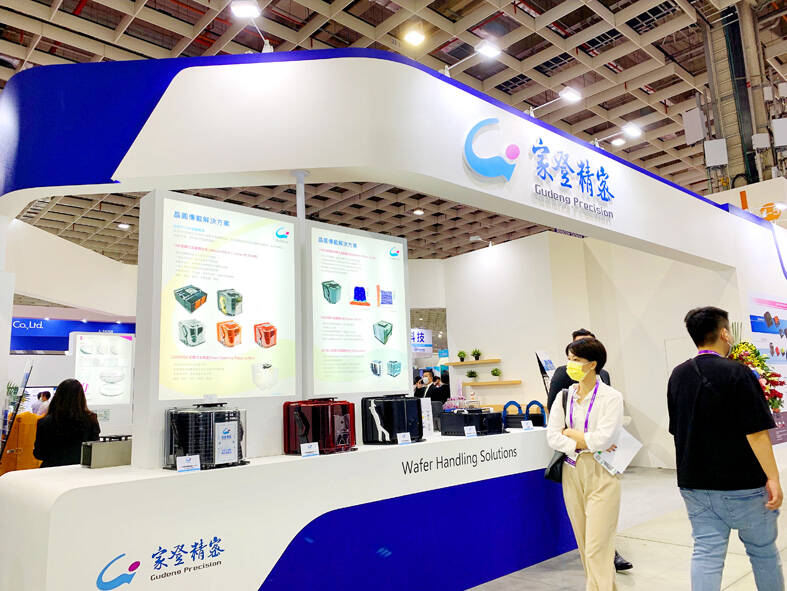Gudeng Precision Industrial Co (家登精密), which supplies wafer pods to the world's major semiconductor firms, yesterday announced plans to form a new venture to accelerate supply chain deployment in the US in the wake of new US trade and tariff policies.
Gudeng would be joined by several companies in the local semiconductor supply chain, as they seek to cope with dramatic changes in the geopolitical situation and US President Donald Trump’s trade policies, Gudeng said.
It comes as Taiwan Semiconductor Manufacturing Co (TSMC, 台積電) last week announced an additional US$100 billion investment in the US, which includes three chip manufacturing fabs, two advanced chip packaging plants and a research-and-development center.

Photo: Grace Hung, Taipei Times
Two years ago, Gudeng initiated the idea of forming an alliance with eight local semiconductor companies, creating a new company, TSS Holdings Ltd (德鑫半導體控股), focusing on its operations in the US.
Member companies distribute and supply products to customers in the US, as well as provide real-time services through a more cost-effective approach, Gudeng said.
The new venture, which would be similar to that of TSS, is to be established later this year.
About 10 companies are participating, including specialty plastic compounds producer Nytex Composites Co (耐特科技) and AblePrint Technology Co (印能科技), which specializes in key equipment used in advanced chip packaging technology, such as chip-on-wafer-on-substrate (CoWoS).
Members of both alliances are direct or indirect suppliers to TSMC, providing wafer pods, semiconductor materials, advanced chip packaging-related equipment and industrial intelligence applications.
Gudeng, a key supplier of extreme ultraviolet (EUV) and high-numerical aperture EUV pods to TSMC, is considering building its first production base in the US to address growing demand from key customers.
It also supplies advanced front-opening unified pods and wafer cassettes to TSMC and Intel Corp, as well as Chinese and South Korean chipmakers. Gudeng has a warehouse in Arizona.
The company said its new pods, used in the production procedure of CoWoS, are currently undergoing qualification by customers.
The new products are expected to fuel the company’s growth momentum, as one of its major customers is boosting CoWoS capacity in the second half of this year and another key customer is restarting its CoWoS projects following a two-year suspension, Gudeng said.

SELL-OFF: Investors expect tariff-driven volatility as the local boarse reopens today, while analysts say government support and solid fundamentals would steady sentiment Local investors are bracing for a sharp market downturn today as the nation’s financial markets resume trading following a two-day closure for national holidays before the weekend, with sentiment rattled by US President Donald Trump’s sweeping tariff announcement. Trump’s unveiling of new “reciprocal tariffs” on Wednesday triggered a sell-off in global markets, with the FTSE Taiwan Index Futures — a benchmark for Taiwanese equities traded in Singapore — tumbling 9.2 percent over the past two sessions. Meanwhile, the American depositary receipts (ADRs) of Taiwan Semiconductor Manufacturing Co (TSMC, 台積電), the most heavily weighted stock on the TAIEX, plunged 13.8 percent in

A wave of stop-loss selling and panic selling hit Taiwan's stock market at its opening today, with the weighted index plunging 2,086 points — a drop of more than 9.7 percent — marking the largest intraday point and percentage loss on record. The index bottomed out at 19,212.02, while futures were locked limit-down, with more than 1,000 stocks hitting their daily drop limit. Three heavyweight stocks — Taiwan Semiconductor Manufacturing Co (TSMC, 台積電), Hon Hai Precision Industry Co (Foxconn, 鴻海精密) and MediaTek (聯發科) — hit their limit-down prices as soon as the market opened, falling to NT$848 (US$25.54), NT$138.5 and NT$1,295 respectively. TSMC's

TARIFFS: The global ‘panic atmosphere remains strong,’ and foreign investors have continued to sell their holdings since the start of the year, the Ministry of Finance said The government yesterday authorized the activation of its NT$500 billion (US$15.15 billion) National Stabilization Fund (NSF) to prop up the local stock market after two days of sharp falls in reaction to US President Donald Trump’s new import tariffs. The Ministry of Finance said in a statement after the market close that the steering committee of the fund had been given the go-ahead to intervene in the market to bolster Taiwanese shares in a time of crisis. The fund has been authorized to use its assets “to carry out market stabilization tasks as appropriate to maintain the stability of Taiwan’s

In a small town in Paraguay, a showdown is brewing between traditional producers of yerba mate, a bitter herbal tea popular across South America, and miners of a shinier treasure: gold. A rush for the precious metal is pitting mate growers and indigenous groups against the expanding operations of small-scale miners who, until recently, were their neighbors, not nemeses. “They [the miners] have destroyed everything... The canals, springs, swamps,” said Vidal Britez, president of the Yerba Mate Producers’ Association of the town of Paso Yobai, about 210km east of capital Asuncion. “You can see the pollution from the dead fish.